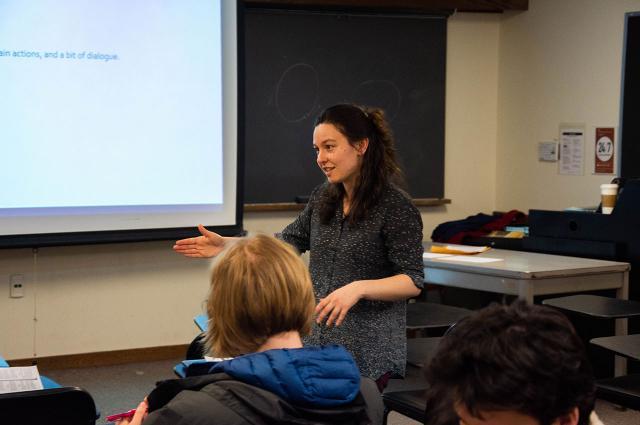Wandering Videogames: Play, Performance, Protest

Instructor Melissa Kagen. Photograph by Siddhant Talwar
Dr. Kagen is a visiting scholar at the MIT Game Lab in association with the board games & colonialism project. She received her PhD from Stanford University in German Studies, and her research focused on wandering in early 20th century German/Jewish opera. “Wandering as a concept has been my pivot point, from the myth of the Wandering Jew, to theories of pedestrian performance, to my current focus on wandering in games,” she explains. Dr. Kagen is also an Associate Editor of the Journal of Gaming and Virtual Worlds and has experience in theater, having designed and produced nine operatic productions.
By focusing on “walking simulators” – which are non-violent videogames centered on the exploration of a narratively-rich environment – students in the course consider wandering as an act of performance, philosophy, protest, and/or play. Dr. Kagen reveals the hidden motivations and purposes for why one wanders and the profound effect it can have artistically and politically. For example, she presents students with parallels between the real world and games, such as between the Civil Rights Marches and the walking simulator Gone Home. In doing so, students explore the deeper implications that wandering has on the game, on the self, and on reality.
A walking simulator allows people to delve into a story and setting without risk of death. Furthermore, without imposed time constraints or the stress of completing tasks, the player is free to learn about the story and setting by examining objects, documents, or other clues left around the environment. Though the name “walking simulator” was originally used to mock the presumed pointlessness of these games, the term now respectfully refers to games that are interested in alternative modes of expression, lacing together themes of embodiment, environment, orientation, and community.
In each class, students spend time on their feet completing various wandering experiments. In fact, it is common for seminars to take place while walking around campus. For homework, students are assigned to play popular walking simulators such as The Stanley Parable, What Remains of Edith Finch, and the previously mentioned Gone Home.
The course has three main assignments. The first two projects ask students to design a concept for their own walking simulator and to create a plan for a protest. The final project is an open-ended assignment. “It could be a game design prototype in Unity, an AR/VR project, a long-form essay or piece of creative non-fiction, a fully-realized version of an earlier assignment, or an open meditation on wandering,” Dr. Kagen says.
Besides leaving the course with two design plans and a fully-completed project, students will come away with a new understanding of the importance of wandering and the creative potential it holds. Exposing how our digital actions can be embodied into social and political ones, this course shows us that wandering isn’t always “aimless”.
About the Author
Kaycee Feldman is a first-year student planning to earn a double major in Astrophysics and Film & Media Studies. Hailing from the small town of Doylestown, Pennsylvania, just outside of Philadelphia, she is highly interested in both the arts and sciences and how they can overlap. When not writing for the ExCollege, she can instead be found writing science fiction and horror stories that she intends to convert into screenplays.